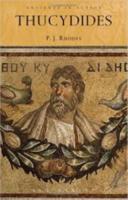
Bloomsbury Academic (2015) p/b 104pp £16.99 (ISBN 139781472523990)
Thucydides has a much higher media profile today than might be expected. He is required reading for many students of political science and international relations particularly in the USA, and so a new short introduction is welcome, not only to classicists. R. provides four chapters outlining the world of Thucydides and then goes on to examine his work as a historian and as a thinker. He concludes with an account of his reception in later periods.
Those who want to be introduced to Thucydides as a political scientist or philosopher will find that there is a lot of history to be taken into account first. Unless the reader has mastered an outline of the history of the Peloponnesian War, then discussions of his narrative technique or the extent to which the opinions in the speeches can be attributed to the person speaking are likely to be tricky to comprehend. The longest section (chapter 2) is devoted to such questions and is based upon frequent reference to specific events and chapters of Thucydides which demand knowledge of the original text. Linguists will also find it a useful research tool with a wide range of reference. Rhodes outlines all the right questions to ask about the text and sends the reader back to find the places which will yield the answers: what is the moral basis for how states behave towards each other? Is it possible for the historian to be unbiased? Can there be such a thing as international law?
The other sections on his philosophy and reception deal with the changes in Thucydides’ reputation from the earlier view of his complete independence of thought and dispassionate analysis of human behaviour to the more nuanced current way of thinking which places him more in his historical context. Like many introductions this one would probably be best read after, rather than before, the text; but those readers beginning to get to grips with Thucydides will find this an invaluable guide.
John Bulwer—London
